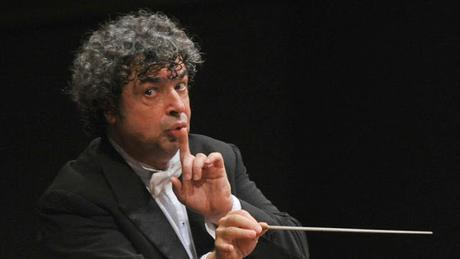by Paul J. Pelkonen

Zip it. Semyon Bychkov in action at the Proms in 2013.
Photo by Chris Christodoulou from SemyonBychkov.com.
For this first concert, Mr. Bychkov and his forces played nothing but works by Antonín Dvořák, the composer who ranks among the most emblematic and popular of musicians from that country. The program featured two Dvořák works that each have a sad and sentimental story to tell: the Cello Concerto with soloist Alisa Weilerstein, and the Symphony No. 7, a work that the composer himself ranked as his highest achievement in that genre.
The Cello Concerto is the final product of Dvořák's two-year sojourn teaching music in America. It bridges the challenges of writing for this soulful instrument with the composer's innate gift for catchy and uplifting themes that rouse the soul. And yet its sad story is that of Dvořák's passionate and illicit love for Josefina Kaunitzova, his sister-in-law. Her illness in 1895 colors much of this work, and at times the soloist seems to be weeping through their four strings.
Mr. Bychkov was quick to establish the robust sound of this orchestra, with fat horns and sonorous heavy brass that in turn supported a lush and rolling carpet of strings. The cello entered, with a dry and slightly hard-edged tone that provided a refreshing contrast to the rich orchestration. The great second subject, sounded first in the horns, then by the soloist and finally by the tutti, brought the first movement to a happy close.
The grief-driven solo part dominated the second movement, which featured one of the longest and most challenging cadenzas of the work. Supported by the flutes, Ms. Weilerstein expanded on the thematic material of a particularly melancholy Dvořák song, delving deep into its soul with her bow. The finale starts the slow journey to major key resolution, capped by a meditative passage for Ms. Weilerstein that seemed to trail off, lost in thought. Her last notes were answered by firm, major-key resolution from the orchestra, the composer determined to bring the work to a bright major close.
The death of Dvořák's mother dominated his thinking behind the Symphony No. 7, a bold work that owed much of its character to the composer's desire to emulate the serious intellectual rigor of his friend, colleague and supporter Johannes Brahms. Indeed the first movement here, was redolent of dark, polished wood panels in some noble house, with the orchestra sounding out a solemn tread and playing with flexability and power under Mr. Bychkov. The eloquent slow movement, which repeatedly checks in with the chromaticism of Wagner's Tristan suggests some veiled and secret love affair.
However, Dvořák is not Brahms, and the sunny character of his persona emerges part-way through this masterful symphony. Indeed, the Scherzo could hardly contain its sense of riotous energy. The finale too went from the steady tramp of a funeral march to a very different place indeed, finishing in the bright key of D Major and once again lifting the audience, both to a better emotional place and to their feet for a riot of applause. Mr. Bychkov obliged their reception with more Dvořák: two of his Symphonic Dances as an encore, one slow and one joyfully fast.

